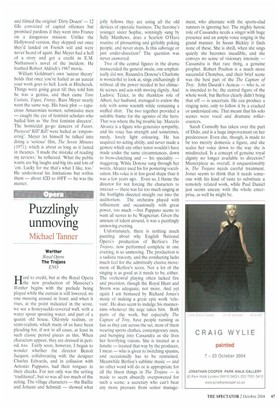Puzzlingly unmoving
Michael Tanner
Werther Royal Opera The Trojans ENO
Hard to credit, but at the Royal Opera the new production of Massenet's Werther begins with the prelude being played while the curtain is still lowered, no one messing around in front: and when it rises, at the point indicated in the score, we see a honeysuckle-covered wall, with a water spout spouting water, and part of a quaint old house. Old-style realism, or semi-realism, which many of us have been pleading for, if not in all cases, at least in such classic period pieces as this. When characters appear, they are dressed in period. too. Fairly soon, however, I began to wonder whether the director Benoit Jacquot, collaborating with the designer Charles Edwards, and in collusion with Antonio Pappano, had their tongues in their cheeks. For not only was the setting 'traditional', but so was all too much of the acting. The village characters — the Baillie and Johann and Schmidt — showed what
jolly fellows they are using all the old devices of operatic business. The heroine's younger sister Sophie, winningly sung by Sally Matthews, does a Scarlett O'Hara routine of pirouetting and girlishly poking people, and never stops. Is this sabotage or just under-direction? The question was never answered.
Two of the central figures in the drama transcended the general mode, one emphatically did not. Ruxandra Donose's Charlotte is wonderful to look at, sings enehantingly if without all the power needed in her climactic scenes, and acts with moving dignity. And Ludovic Tezier, in the thankless role of Albert, her husband, managed to endow the role with some warmth while remaining a stuffed shirt, The two together provided a suitable frame for the agonies of the hero. That was where the big trouble lay. Marcelo Alvarez is a figure who generates sympathy, and his voice has strength and sometimes, rarely, lovely light colouring. He has acquired no acting ability, and never made a gesture which any other tenor wouldn't have made under the same circumstances, down to brow-clutching and — his speciality — staggering. While Donose sang through her words. Alvarez Used his for posturing vocalisation. His voice is in less good shape than it was a few years ago. Even so, I blame the director for not forcing the characters to interact — there was far too much singing at the footlights directed straight out into the auditorium. The orchestra played with refinement and occasionally with great power, too much —but Pappano seems to want all scores to be Wagnerian. Given the amount of talent around, it was a puzzlingly unmoving evening.
Unfortunately, there is nothing much puzzling about why English National Opera's production of Berlioz's The Trojans, now performed complete in one evening, is so unmoving. The production is a sadistic travesty, and the conducting lacks much feel for the admittedly elusive movement of Berlioz's score. Not a lot of the singing is as good as it needs to be, either. The orchestral playing often lacked fire and precision, though the Royal Hunt and Storm was adequate, not more. And yet again I am bemused by Richard Jones's mode of making a great epic work 'relevant'. He does seem to indulge his mannerisms whenever the urge takes him. Both parts of the work, but especially The Capture of Troy, have people running as fast as they can across the set, most of them wearing sports clothes, contemporary ones, and bumping into Cassandra as she lives her horrifying visions. She is treated as a lunatic — treated that way by the producer, I mean — who is given to twitching spasms, and occasionally has to be restrained. Meanwhile Berlioz's sublime music — and no other word will do or is appropriate for all the finest things in The Trojans — is made to seem absurdly overpowered for such a scene: a secretary who can't bear any more pressure from senior manage
ment, who alternate with the sports-clad runners in ignoring her. The mighty heroic role of Cassandra needs a singer with huge presence and an ample voice singing in the grand manner. In Susan Bickley it finds none of these. She is shrill, when she sings quietly she becomes inaudible, and she conveys no sense of visionary intensity — Cassandra is that rare thing, a genuine prophet. Robert Poulton is a much more successful Chorebus, and their brief scene was the best part of the The Capture of Troy. John Daszak's Aeneas — who is, or is intended to be, the central figure of the whole work, but Berlioz clearly didn't bring that off — is uncertain. He can produce a ringing note. only to follow it by a cracked or undersized one. That meant that his solo scenes were vocal and dramatic rollercoasters.
Sarah Connolly has taken over the part of Dido, and is a huge improvement on her predecessor. Even she, though, is made to be too merely domestic a figure, and she scales her voice down to the way she is misdirected. Is a concept of genuine royal dignity no longer available to directors? Masterpiece as, overall, it unquestionably is, The Trojans needs careful treatment. Jones seems to think that it needs someone with his kind of taste to substitute a remotely related work, while Paul Daniel just seems uneasy with the whole enterprise, as well he might be.


















































































 Previous page
Previous page